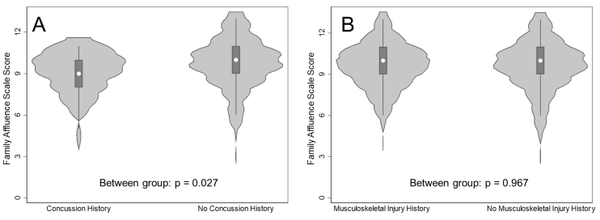-
Home
-
About JCTR
-
Gold Open Access
-
Issues
-
Editorial board
-
Author guidelines
-
Publication fees
-
Online first
-
Special issues
-
News
-
Publication ethics
-
Partners
-
Submit your manuscript
-
Submit your review report
-
Editorial Office
-

This work is licensed under a Creative Commons Attribution-NonCommercial 4.0 International License. ISSN print: 2382-6533 ISSN online: 2424-810X
Volume 8 Issue 4
Socioeconomic status and injury history in adolescent athletes: lower family affluence is associated with a history of concussion
Kartik Sidhar, Christine M. Baugh, Julie C. Wilson, Jack Spittler, Gregory A. Walker, Aubrey M. Armento, David R. Howell*
Sidhar et al. J Clin Transl Res 2022; 8(4):4
Published online: July 18, 2022
Abstract
Background: While healthcare and health outcome disparities have been studied across a variety of different injuries, their relation to concussion incidence and management are relatively understudied.
Aim: To evaluate the association between history of concussion or musculoskeletal injury, and family affluence and/or school-level measures of socioeconomic status
Methods: We conducted a cross-sectional study of adolescent athletes in a local school district. Adolescent athletes (N=192; mean age=15.3, SD=1.6 years; 49% female), who presented for a pre-participation physical evaluation reported concussion and injury history, and family affluence scale (FAS) scores. We also examined the percent of students on free/reduced lunch at each school compared to state averages. Independent variables, individual FAS score and school-based marker of socioeconomic status, were compared between those with and without a history of concussion and time-loss musculoskeletal injury.
Results: Of the participants, n=40 (21%) reported a history of concussion. Athletes with a concussion history had significantly lower FAS scores than athletes without a history of concussion (mean difference = 0.7, 95%CI= 0.1, 1.4; p=0.027). There was no significant difference in FAS scores between those with and without a history of time-loss musculoskeletal injury (mean difference=0.0, 95% CI=-0.5, 0.5; p= 0.97). Athletes with a history of concussion had a higher proportion of a prior time-loss musculoskeletal injury (68% vs. 32%; p<0.001). After adjusting for age, school free-reduced lunch rate, and history of musculoskeletal injury, a lower FAS score was associated with concussion history (adjusted odds ratio=0.79; 95% CI=0.64, 0.96; p=0.019). Concussion and musculoskeletal injury were not associated with school-level markers of socioeconomic status.
Conclusion: Lower individual, but not school-level measures of socioeconomic status were associated with a history of concussion in our sample of adolescent athletes.
Relevance for Patients: Enhance providers’ understanding of how socioeconomic factors may impact concussion history and empower providers to adequately screen for and provide concussion education to mitigate disparities.

DOI: http://dx.doi.org/10.18053/jctres.08.202204.004
Author affiliation
1. Sports Medicine Center, Children’s Hospital Colorado, Aurora, CO, USA
2. Department of Orthopedics, University of Colorado School of Medicine, Aurora, CO, USA
3. Center for Bioethics and Humanities, University of Colorado Anschutz Medical Campus, Aurora, CO
4. Division of General Internal Medicine, University of Colorado School of Medicine, Aurora, CO
5. Department of Pediatrics, University of Colorado School of Medicine, Aurora, CO, USA
6. Department of Family Medicine, University of Colorado School of Medicine, Aurora, CO, USA
*Corresponding author
David R. Howell
Sports Medicine Center, Children’s Hospital Colorado; Department of Orthopedics, University of Colorado School of Medicine. Address: 13123 E. 16th Avenue, B060 Aurora, CO 80045.
Tel: +1 7207771502
Email: David.Howell@CUAnschutz.edu
Handling editor:
Michal Heger
Department of Pharmaceutics, Utrecht University, the Netherlands
Department of Pharmaceutics, Jiaxing University Medical College, Zhejiang, China

